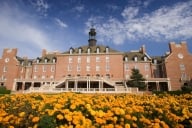You have /5 articles left.
Sign up for a free account or log in.
Midway through the nation’s first application cycle in which gay people can self-identify and qualify for a scholarship, prospective Elmhurst College students seem comfortable addressing their sexual orientation.
But the new policy hasn’t spawned a windfall of openly gay applicants. About 5 percent of the 2,204 applicants so far this year have identified themselves as LGBT (lesbian, gay, bisexual or transgender), Elmhurst admissions dean Gary Rold said.
Few applicants have skipped the optional question asking whether they identify as lesbian, gay, bisexual or transgender, Rold said, and it doesn’t appear straight students are cheating the system to receive the diversity “enrichment scholarship” that’s worth one-third of Elmhurst’s $29,994 tuition. When Elmhurst announced its policy, skeptics predicted many students would be uncomfortable, or that straight applicants would declare themselves gay to get the scholarship money.
The liberal arts college in suburban Chicago made headlines in August when it became the first American institution to explicitly ask applicants whether they identify as LGBT. The college president drafted an open letter in September after fielding questions from alumni and others.
The question isn’t used to make admissions decisions but does qualify students for the diversity scholarship if they're admitted. Around 65 percent of applicants are accepted each year to the student body of about 3,125 undergraduates.
For Rold, the importance of the new question was revealed when a young applicant from the South spoke with an Elmhurst admissions counselor just before Thanksgiving. Upon learning he was gay, the boy's parents “basically threw him out of the house” and left him looking for a place to stay for the final months of high school, Rold said.
“Stories like that really led us to this position,” he said. “These kids are up against it in a lot of different ways. If we can help them transition, so much the better -- but we have to know who's who first.”
Other universities have questions that hint at sexual orientation, allowing prospective students to check a box indicating an interest in gay rights activities on campus. But some gay students might not check that box, and straight applicants interested in gay rights might.
Elmhurst’s plan, Rold said, is a way of finding out exactly how many gay applicants the college is drawing and putting a support system in place for when those students arrive on campus.
Shane Windmeyer, executive director of the Campus Pride advocacy group for gay students, said the initial results are encouraging. He said experts vary in estimating what percentage of the nation’s population is gay – ranging from 3 to 10 percent. The fact that the percentage of Elmhurst applicants who felt comfortable revealing their identity fell within that range is a positive, he said.
“I think it’s an exceptional number for the first semester of doing something and Elmhurst should be proud,” Windmeyer said.
Campus Pride lobbied the Common Application to put a similar question on its form. Common App board members discussed and rejected that measure last year.
But Windmeyer sees increased interest in asking applicants about sexual identity, and Rold said he’s fielded inquiries from college administrators curious about the program’s success at Elmhurst.
The policy isn't just about the scholarship, Rold said, it's about welcoming gay students. Even at colleges where offering gay applicants a diversity scholarship isn’t feasible, Windmeyer still sees value in asking about sexual identity.
“Just having the question sends a message that it’s important to us and we want to know,” he said.
Rold doubts Elmhurst draws more gay students because of the new policy -- he's seen a 2.5 percent uptick in applications this year, but that's not enough for the admissions staff to prove causation. Either way, he said, the question should reaffirm Elmhurst's accepting culture to students already considering the college.
Elmhurst is affiliated with the United Church of Christ, which in 1968 became America’s first mainstream Christian denomination to ordain an openly gay person.








